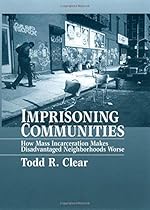Read Imprisoning Communities: How Mass Incarceration Makes Disadvantaged Neighborhoods Worse (Studies in Crime and Public Policy) by Todd R Clear Online
^ Imprisoning Communities: How Mass Incarceration Makes Disadvantaged Neighborhoods Worse (Studies in Crime and Public Policy) É PDF Read by # Todd R Clear eBook or Kindle ePUB Online free. Imprisoning Communities: How Mass Incarceration Makes Disadvantaged Neighborhoods Worse (Studies in Crime and Public Policy) At no time in history, and certainly in no other democratic society, have prisons been filled so quickly and to such capacity than in the United States. Especially at risk are children who, research shows, are more likely to commit a crime if a father or brother has been to prison. Clear makes the counterintuitive point that when incarceration concentrates at high levels, crime rates will go up. In the first detailed, empirical exploration of the effects of mass incarceration on poor places, He is the author of eleven books and numerous articles and book chapters on criminal justice issues ranging from corrections and sentencing to community justice.. Todd R. Clear is a Distinguished Professor at John Jay College of Criminal Justice, City University of New York, and founding editor of the jour Download as PDF : Click Here Download as DOC : Click Here Download as RTF : Click Here
Title
:
Imprisoning Communities: How Mass Incarceration Makes Disadvantaged Neighborhoods Worse (Studies in Crime and Public Policy)
Author
:
Rating
:
4.35 (979 Votes)
Asin
:
0195305795
Format Type
:
paperback
Number of Pages
:
280 Pages
Publish Date
:
2017-08-04
Language
:
English
Clear also offers a compelling new vision for justice, one that would rebuild the same communities that have suffered such enormous harm. Anyone interested in crime policy should read this book."--Jeremy Travis, President, John Jay College of Criminal Justice"Timely and compelling."--Harvard Law Review"Clear's analysis shows how mass incarceration disrupts the moving parts of neighborhood life and corrodes neighborhood capacity for self-regulation This is required reading for those searching for the foundations of a principled punishment policy."--Jeffrey Fagan, Professor of Law and Public Health, Columbia University. "This ambitious book is more than an indictment of the status quo
At no time in history, and certainly in no other democratic society, have prisons been filled so quickly and to such capacity than in the United States. Especially at risk are children who, research shows, are more likely to commit a crime if a father or brother has been to prison. Clear makes the counterintuitive point that when incarceration concentrates at high levels, crime rates will go up. In the first detailed, empirical exploration of the effects of mass incarceration on poor places, Imprisoning Communities demonstrates that in high doses incarceration contributes to the very social problems it is intended to solve: it breaks up family and social networks; deprives siblings, spouses, and parents of emotional and financial support; and threatens the economic and political infrastructure of already struggling neighborhoods. In the most impoverished places, as much as 20% of the adult men are locked up on any given day, and there is hardly a family without a father, son, brother, or uncle who has not been behind
Five Stars Thought provoking and sensible.. "A Prison Employee" according to PRH. This book is on the money with research and experience. It is one of many that policy makers and prison administrators should read.I have only two problems with the book. Early in the book the author sounds like a raving liberal (but he saved this by presenting unbiased evidence throughout the rest of the book). Also, in chapter 8, the author seems to. "Strong and intelligent argument" according to doug korty. Todd Clear makes a very strong and intelligent argument supporting his thesis. He proposes a number of possible changes to the criminal justice system based on reform programs that have already succeeded in various places. He is clearly very knowledgeable and dedicated. I don't think he puts enough emphasis on the general social problems of the communDownload Imprisoning Communities: How Mass Incarceration Makes Disadvantaged Neighborhoods Worse (Studies in Crime and Public Policy)
